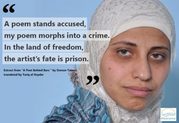5 feb 2018

PayPal, already facing pressure for its refusal to provide services to Palestinians living under Israeli military occupation, appears to be going a step further in its anti-Palestinian efforts.
Last week it abruptly shut down the account of a major Palestine solidarity group in France without providing an explanation.
In taking this action, the global payment and money transfer firm appears to be caving in to pressure from Israel and its lobby groups.
Association France Palestine Solidarité said in a statement on Saturday that it had just been informed of the “unexpected blocking” of its PayPal account, adding that several pro-Israeli websites had been crowing about the news.
AFPS said that on 26 January it received “a very succinct email from PayPal informing us of the closure of our account ‘because of the nature of our activities.’”
According to AFPS, this action came “without giving a reason and without contractually stipulated notice, despite the fact that our activities have been identical for years and we have never had a problem with our account.”
Notably, AFPS is one of 20 human rights organizations placed on a blacklist by Israeli authorities earlier this month, barring its members from entering any Israeli-controlled territory.
The group says it is demanding an explanation from PayPal and could take legal action.
Israel lobby operation
The closing of the French group’s PayPal account does appear to be a continuation of Israel’s efforts to crack down on supporters of Palestinian rights.
As intense propaganda efforts have failed to stem the growth of support for Palestinian rights in Europe and around the world, Israel has turned increasingly to censorship, repression and lawfare.
Notably, Gerald Steinberg, the head of the right-wing Israeli group NGO Monitor that harasses and smears human rights and activist groups, boasted on Twitter that his organization’s “research” about AFPS was cited in a Jerusalem Post article celebrating the shutdown of the PayPal account.
The Jerusalem Post article is written by Benjamin Weinthal, nominally a journalist, but in reality a key operative of Israel’s anti-Palestinian campaign in Europe.
Weinthal specializes in smearing activists and groups and in 2010 teamed up with NGO Monitor to make false allegations against The Electronic Intifada.
Weinthal is also a “senior fellow” at the Foundation for the Defense of Democracies, an American neoconservative group that has attempted to smear the grassroots, nonviolent boycott, divestment and sanctions (BDS) movement as linked to Hamas and Iran.
“Due to customer confidentiality, we cannot comment on the details of any specific PayPal account,” Weinthal reported the company telling him in response to an inquiry.
“However, we would like to stress that PayPal has zero tolerance for the use of our secure payments platform to facilitate illegal activities,” the company added.
In his article, Weinthal claims credit for approaching PayPal, suggesting to it that AFPS was breaking French law by supporting the nonviolent BDS movement.
He also takes credit for similar pressure which he claims resulted in the shut down of the accounts of other Palestine solidarity groups in 2016.
Pressure on Silicon Valley
The focus on PayPal comes amid a concerted campaign by Israel to pressure other Silicon Valley companies including Facebook, Twitter and Google to censor Palestinians and their supporters on its behalf.
Facebook has admitted that it deletes accounts at the direction of the US and Israeli governments.
Isolating Palestinians
PayPal’s corporate propaganda claims that it is “giving opportunity to people across the globe.”
But the company is already the focus of an ongoing activist campaign over its refusal to provide services to Palestinians in the occupied West Bank and Gaza Strip.
The platform has become perhaps the most common way for people around the world to carry out direct transactions with each other easily and with much less cost and complication than traditional bank or money transfer services.
Until there are widely accepted alternatives to PayPal, the company’s refusal to serve Palestinians living under military occupation and siege leaves them even more isolated.
Last year, Dalia Shurrab, an entrepreneur in Gaza, told The Electronic Intifada about the damage done by PayPal’s discrimination against Palestinians.
“PayPal’s restrictions majorly disadvantage Palestinian startup and tech companies,” Shurrab said, “essentially rigging the game in favor of their competitors in the rest of the Middle East and North Africa.”
Shurrab said that entrepreneurship in Gaza is growing fast, but PayPal’s global dominance in relatively inexpensive person-to-person payments acts as a real brake given its refusal to serve Palestinians.
Shurrab had wanted to launch her own startup, but was forced to abandon the plan given lack of access to payment. “Because PayPal does not operate in Gaza,” Shurrab said, she rarely receives payment for her freelance work.
PayPal also owns the fast growing US-only person-to-person payment service Venmo.
Undeterred
Association France Palestine Solidarité said its ability to accept donations has not been affected by the closure of its PayPal account, as it had already decided to switch its processing of donations to a different company.
Moreover, AFPS says that the attacks by the Israel lobby are an unintended tribute to the work it is doing.
The group said: “In spite of the enormous means deployed in order to gag us, we are confident that we will be able to count on the political and financial support of all who refuse to accept violations of the law as a rule of conduct in order to crush the Palestinian people.”
Last week it abruptly shut down the account of a major Palestine solidarity group in France without providing an explanation.
In taking this action, the global payment and money transfer firm appears to be caving in to pressure from Israel and its lobby groups.
Association France Palestine Solidarité said in a statement on Saturday that it had just been informed of the “unexpected blocking” of its PayPal account, adding that several pro-Israeli websites had been crowing about the news.
AFPS said that on 26 January it received “a very succinct email from PayPal informing us of the closure of our account ‘because of the nature of our activities.’”
According to AFPS, this action came “without giving a reason and without contractually stipulated notice, despite the fact that our activities have been identical for years and we have never had a problem with our account.”
Notably, AFPS is one of 20 human rights organizations placed on a blacklist by Israeli authorities earlier this month, barring its members from entering any Israeli-controlled territory.
The group says it is demanding an explanation from PayPal and could take legal action.
Israel lobby operation
The closing of the French group’s PayPal account does appear to be a continuation of Israel’s efforts to crack down on supporters of Palestinian rights.
As intense propaganda efforts have failed to stem the growth of support for Palestinian rights in Europe and around the world, Israel has turned increasingly to censorship, repression and lawfare.
Notably, Gerald Steinberg, the head of the right-wing Israeli group NGO Monitor that harasses and smears human rights and activist groups, boasted on Twitter that his organization’s “research” about AFPS was cited in a Jerusalem Post article celebrating the shutdown of the PayPal account.
The Jerusalem Post article is written by Benjamin Weinthal, nominally a journalist, but in reality a key operative of Israel’s anti-Palestinian campaign in Europe.
Weinthal specializes in smearing activists and groups and in 2010 teamed up with NGO Monitor to make false allegations against The Electronic Intifada.
Weinthal is also a “senior fellow” at the Foundation for the Defense of Democracies, an American neoconservative group that has attempted to smear the grassroots, nonviolent boycott, divestment and sanctions (BDS) movement as linked to Hamas and Iran.
“Due to customer confidentiality, we cannot comment on the details of any specific PayPal account,” Weinthal reported the company telling him in response to an inquiry.
“However, we would like to stress that PayPal has zero tolerance for the use of our secure payments platform to facilitate illegal activities,” the company added.
In his article, Weinthal claims credit for approaching PayPal, suggesting to it that AFPS was breaking French law by supporting the nonviolent BDS movement.
He also takes credit for similar pressure which he claims resulted in the shut down of the accounts of other Palestine solidarity groups in 2016.
Pressure on Silicon Valley
The focus on PayPal comes amid a concerted campaign by Israel to pressure other Silicon Valley companies including Facebook, Twitter and Google to censor Palestinians and their supporters on its behalf.
Facebook has admitted that it deletes accounts at the direction of the US and Israeli governments.
Isolating Palestinians
PayPal’s corporate propaganda claims that it is “giving opportunity to people across the globe.”
But the company is already the focus of an ongoing activist campaign over its refusal to provide services to Palestinians in the occupied West Bank and Gaza Strip.
The platform has become perhaps the most common way for people around the world to carry out direct transactions with each other easily and with much less cost and complication than traditional bank or money transfer services.
Until there are widely accepted alternatives to PayPal, the company’s refusal to serve Palestinians living under military occupation and siege leaves them even more isolated.
Last year, Dalia Shurrab, an entrepreneur in Gaza, told The Electronic Intifada about the damage done by PayPal’s discrimination against Palestinians.
“PayPal’s restrictions majorly disadvantage Palestinian startup and tech companies,” Shurrab said, “essentially rigging the game in favor of their competitors in the rest of the Middle East and North Africa.”
Shurrab said that entrepreneurship in Gaza is growing fast, but PayPal’s global dominance in relatively inexpensive person-to-person payments acts as a real brake given its refusal to serve Palestinians.
Shurrab had wanted to launch her own startup, but was forced to abandon the plan given lack of access to payment. “Because PayPal does not operate in Gaza,” Shurrab said, she rarely receives payment for her freelance work.
PayPal also owns the fast growing US-only person-to-person payment service Venmo.
Undeterred
Association France Palestine Solidarité said its ability to accept donations has not been affected by the closure of its PayPal account, as it had already decided to switch its processing of donations to a different company.
Moreover, AFPS says that the attacks by the Israel lobby are an unintended tribute to the work it is doing.
The group said: “In spite of the enormous means deployed in order to gag us, we are confident that we will be able to count on the political and financial support of all who refuse to accept violations of the law as a rule of conduct in order to crush the Palestinian people.”

The Israeli Salem military court sentenced a Palestinian detainee to 12 months in jail.
The Salem court ruled that prisoner Mohamed Allan, aged 33 and from Nablus province, be jailed for 12 months.
Allan’s father said his son was sent to prison on charges of incitement on Facebook and that the occupation authorities imposed on him a fine of up to 2,000 shekels.
Prisoner Allan, a lawyer, was kidnapped by the Israeli occupation forces from his home on June 8, 2017. He immediately started a 30-day hunger strike to protest Israeli intents to sentence him administratively, with neither charge nor trial.
In 2014, Allan had gone on a 65-day hunger strike in Israeli lock-ups to protest his administrative detention, which lasted nearly for one year.
The Salem court ruled that prisoner Mohamed Allan, aged 33 and from Nablus province, be jailed for 12 months.
Allan’s father said his son was sent to prison on charges of incitement on Facebook and that the occupation authorities imposed on him a fine of up to 2,000 shekels.
Prisoner Allan, a lawyer, was kidnapped by the Israeli occupation forces from his home on June 8, 2017. He immediately started a 30-day hunger strike to protest Israeli intents to sentence him administratively, with neither charge nor trial.
In 2014, Allan had gone on a 65-day hunger strike in Israeli lock-ups to protest his administrative detention, which lasted nearly for one year.
4 feb 2018

A Palestinian social media rights group has condemned the Facebook administration for persisting in its unjust censorship campaign during the current year against Palestinian pages belonging to news agencies or activists.
According to a report released by “Sada Social” on Saturday, Facebook has committed 14 new violations against Palestinian contents on its platform in January, including the removal of nine pages such as those belonging to al-Aqsa satellite channel, the popular committees against the occupation, and the fans of late president Abu Ammar.
Other violations included the deletion of postings supporting the Palestinian cause or opposing the occupation from pages belonging to Palestinian journalists and activists.
Sada Social said that Facebook officially admitted that it had responded to 472 requests by the Israeli government asking for blocking accounts or postings during the first quarter of 2017.
Facebook cited incitement against Israel and its citizens to justify its measures against Palestinian accounts, while ignoring Israeli incitement against the Palestinians on its platform.
According to a report released by “Sada Social” on Saturday, Facebook has committed 14 new violations against Palestinian contents on its platform in January, including the removal of nine pages such as those belonging to al-Aqsa satellite channel, the popular committees against the occupation, and the fans of late president Abu Ammar.
Other violations included the deletion of postings supporting the Palestinian cause or opposing the occupation from pages belonging to Palestinian journalists and activists.
Sada Social said that Facebook officially admitted that it had responded to 472 requests by the Israeli government asking for blocking accounts or postings during the first quarter of 2017.
Facebook cited incitement against Israel and its citizens to justify its measures against Palestinian accounts, while ignoring Israeli incitement against the Palestinians on its platform.
27 jan 2018

Israel Hayom newspaper on Friday revealed that a new Israeli system will be launched to monitor "ant-Semitic" posts on social media networks.
According to the Hebrew newspaper, the new system, developed by the Israeli war ministry, is going to be the most advanced in the world.
The paper added that in the first phase the system will be monitoring Facebook and Twitter posts written in four languages: English, Arabic, French and German.
The monitoring and search operations will be later expanded to include more languages to block the accounts that publish anti-Israel or anti-Semitism posts.
According to the Hebrew newspaper, the new system, developed by the Israeli war ministry, is going to be the most advanced in the world.
The paper added that in the first phase the system will be monitoring Facebook and Twitter posts written in four languages: English, Arabic, French and German.
The monitoring and search operations will be later expanded to include more languages to block the accounts that publish anti-Israel or anti-Semitism posts.
14 jan 2018

By Ramona Wadi
Israeli Agricultural Minister Uri Ariel wants more injured and dead Palestinians in Gaza. “What is this special weapon we have that we fire and see pillars of smoke and fire, but nobody gets hurt?” he said on local radio. “It is time for there to be injuries and deaths as well.” This was reported by Haaretz.
Ariel’s comments come at a time when, bolstered and emboldened by US support over Jerusalem, Israel is seeking to increase ways in which Palestinians are restricted even further in terms of politics, freedom of movement and resistance to its military occupation. The increasingly threatening rhetoric, combined with its often resultant violence, is a clear message that Israel wants Palestinian existence to be determined according to its own colonial needs.
Indeed the minister’s remarks are indicative of Israel’s need for violence and conflict to sustain its existence. Framing his penchant for more deaths against the narrative of the purported “Palestinian terrorist”, he also amalgamated his demands with Defence Minister Avigdor Lieberman’s comments from 2016. At that time, far-right extremist Lieberman recommended the further fragmentation of Palestinians by suggesting that the homes of those involved in resistance should be demolished, and that those who “desire coexistence” should be rewarded.
Lieberman’s differentiation of Palestinians, particularly the latter group, is a simplistic approach which negates many of the reasons why not all Palestinians are visibly involved in resistance. One obvious reason which Israel has perpetrated is the juxtaposition of survival due to extreme poverty and lack of basic necessities, and the struggle against several forms of state violence. It also refutes the fact that most Palestinians, unlike the leadership of the Palestinian Authority, do not want to live under colonial rule.
Whether Ariel’s statement suggests yet another military offensive against the Palestinians in the besieged Gaza Strip remains to be seen. However, there is no doubt that demands for state violence against civilians will become more brazen, as Israel basks in the impunity which is sustained on two levels: that generated by its own actions and absence of accountability under the pretext of “security concerns”; and the international community’s endorsement of this false narrative.
Another ramification of Ariel’s words is the separation of the visible injuries and killings in the occupied West Bank and the silent forms of slow extermination in Gaza as a result of Israeli-imposed deprivation. Clearly, he prefers the macabre spectacle of multitudes of injured and dead Palestinian civilians in Gaza and, what is more, he is allowed to express himself in such a manner without censure of any kind, safe in the knowledge that killing Palestinians has not only become normalised, but also expected.
The dehumanization of Palestinians in the Israeli minister’s words is also reflective of how statistics contribute to the absence of Palestinians in terms of collective memory. For Israel, the numbers serve to boost the false claims of self-defense. Conversely, statistics for Palestinians depict the cycles of murder by Israeli institutions. The international community, on the other hand, is partial to the anonymity of numbers, particularly when there is no requirement other than for it to turn a blind eye until Israel decides upon the next phase of Gaza’s destruction, whereupon the UN will exhort the colonial entity’s “right” to defend itself against the colonized. In doing so, it will also affirm its contempt for human rights and resolutions by refusing to uphold the Palestinian people’s right to self-determination and, indeed, their right to resist military occupation by any means available.
– Ramona Wadi is a staff writer for Middle East Monitor (MEMO)
Israeli Agricultural Minister Uri Ariel wants more injured and dead Palestinians in Gaza. “What is this special weapon we have that we fire and see pillars of smoke and fire, but nobody gets hurt?” he said on local radio. “It is time for there to be injuries and deaths as well.” This was reported by Haaretz.
Ariel’s comments come at a time when, bolstered and emboldened by US support over Jerusalem, Israel is seeking to increase ways in which Palestinians are restricted even further in terms of politics, freedom of movement and resistance to its military occupation. The increasingly threatening rhetoric, combined with its often resultant violence, is a clear message that Israel wants Palestinian existence to be determined according to its own colonial needs.
Indeed the minister’s remarks are indicative of Israel’s need for violence and conflict to sustain its existence. Framing his penchant for more deaths against the narrative of the purported “Palestinian terrorist”, he also amalgamated his demands with Defence Minister Avigdor Lieberman’s comments from 2016. At that time, far-right extremist Lieberman recommended the further fragmentation of Palestinians by suggesting that the homes of those involved in resistance should be demolished, and that those who “desire coexistence” should be rewarded.
Lieberman’s differentiation of Palestinians, particularly the latter group, is a simplistic approach which negates many of the reasons why not all Palestinians are visibly involved in resistance. One obvious reason which Israel has perpetrated is the juxtaposition of survival due to extreme poverty and lack of basic necessities, and the struggle against several forms of state violence. It also refutes the fact that most Palestinians, unlike the leadership of the Palestinian Authority, do not want to live under colonial rule.
Whether Ariel’s statement suggests yet another military offensive against the Palestinians in the besieged Gaza Strip remains to be seen. However, there is no doubt that demands for state violence against civilians will become more brazen, as Israel basks in the impunity which is sustained on two levels: that generated by its own actions and absence of accountability under the pretext of “security concerns”; and the international community’s endorsement of this false narrative.
Another ramification of Ariel’s words is the separation of the visible injuries and killings in the occupied West Bank and the silent forms of slow extermination in Gaza as a result of Israeli-imposed deprivation. Clearly, he prefers the macabre spectacle of multitudes of injured and dead Palestinian civilians in Gaza and, what is more, he is allowed to express himself in such a manner without censure of any kind, safe in the knowledge that killing Palestinians has not only become normalised, but also expected.
The dehumanization of Palestinians in the Israeli minister’s words is also reflective of how statistics contribute to the absence of Palestinians in terms of collective memory. For Israel, the numbers serve to boost the false claims of self-defense. Conversely, statistics for Palestinians depict the cycles of murder by Israeli institutions. The international community, on the other hand, is partial to the anonymity of numbers, particularly when there is no requirement other than for it to turn a blind eye until Israel decides upon the next phase of Gaza’s destruction, whereupon the UN will exhort the colonial entity’s “right” to defend itself against the colonized. In doing so, it will also affirm its contempt for human rights and resolutions by refusing to uphold the Palestinian people’s right to self-determination and, indeed, their right to resist military occupation by any means available.
– Ramona Wadi is a staff writer for Middle East Monitor (MEMO)
11 jan 2018

Isael’s Strategic Affairs Ministry has set up a public-benefit corporation to engage in what it calls “mass awareness activities” as part of “the struggle against the delegitimization campaign” against Israel internationally.
Haaretz has obtained a list of the shareholders and directors of the company, Kella Shlomo, who include former Israeli ambassadors to the United Nations.
According to a ministry document, Kella Shlomo people would work via social networks because “the enemy directs most of its awareness and motivating efforts to this area.” Similarly, the document, published by The Seventh Eye, says the organization was expected to carry out “mass awareness activities” and work to “exploit the wisdom of crowds,” an activity defined as “making new ideas accessible to decision-makers and donors in the Jewish world, and developing new tools to combat the delegitimization of Israel.”
This would be done by launching online campaigns, lobbying, engaging organizations abroad and bringing delegations to Israel.
Haaretz has obtained a list of the shareholders and directors of the company, Kella Shlomo, who include former Israeli ambassadors to the United Nations.
According to a ministry document, Kella Shlomo people would work via social networks because “the enemy directs most of its awareness and motivating efforts to this area.” Similarly, the document, published by The Seventh Eye, says the organization was expected to carry out “mass awareness activities” and work to “exploit the wisdom of crowds,” an activity defined as “making new ideas accessible to decision-makers and donors in the Jewish world, and developing new tools to combat the delegitimization of Israel.”
This would be done by launching online campaigns, lobbying, engaging organizations abroad and bringing delegations to Israel.
4 jan 2018
The federation pointed to “the criminal and terrorist acts committed by Israel that require a clear position by Facebook officials.”
“If Facebook justifies its claim by saying that the deleted accounts were practicing incitement, the Federation of Arab Journalist has reviewed the contents of these accounts and found out that they were involved in conveying news and expressing opinions about issues condemning the oppressive Israeli occupation of the Palestinian land.”
“If Facebook justifies its claim by saying that the deleted accounts were practicing incitement, the Federation of Arab Journalist has reviewed the contents of these accounts and found out that they were involved in conveying news and expressing opinions about issues condemning the oppressive Israeli occupation of the Palestinian land.”
1 jan 2018

Israeli occupation prosecution on Monday presented indictments at Ofer Israeli court against the 17-year-old Palestinian detained girl, Ahd al-Tamimi, along with her mother, Nariman, and cousin, Nour.
Israeli occupation forces accused Ahd with attacking an Israeli officer and solider on December 15 in addition to other 5 alleged attacks against Israeli occupation security forces with stones and causing riot.
The indictment against her mother and cousin claimed that they took part in clashes against Israeli occupation forces and practiced incitement on Facebook.
Israeli military prosecution asked the court to extend the detention of the three Palestinians for the third time for the continuation of legal measures.
Israeli occupation forces accused Ahd with attacking an Israeli officer and solider on December 15 in addition to other 5 alleged attacks against Israeli occupation security forces with stones and causing riot.
The indictment against her mother and cousin claimed that they took part in clashes against Israeli occupation forces and practiced incitement on Facebook.
Israeli military prosecution asked the court to extend the detention of the three Palestinians for the third time for the continuation of legal measures.

“A poem stands accused,
my poem morphs into a crime.
In the land of freedom,
the artist’s fate is prison.”
So read the words of a poem written by the young poet Dareen Tatour, who was put in prison under charges of ‘incitement’ in 2015 for a poem that she wrote that was posted on Youtube. She has now been in prison for more than two years, and was supposed to have a court hearing on December 27th, but it was postponed until January.
Dareen’s case has drawn attention from poets and authors worldwide, for the implication it has on free speech.
Several petitions submitted to the Israeli government have called for Dareen’s release, but the government continues to delay her trial on ‘incitement’ charges.
“I’ve never seen the prosecution as obstinate as it has been in Dareen’s case,” attorney Abed Fahoum told Electronic Intifada earlier this year. “I believe that they aim to use her to intimidate and silence all Palestinians.”
In April 2016, Dareen’s court hearing was attended by a local blogger, who wrote, “The prosecution started to rest her case by bringing the policemen that translated the ‘Qawem’ poem to Hebrew. The scene was completely surrealistic. Poems, by their very nature, are contradictory to the concept of “proven beyond reasonable doubt” that stands at the heart of the criminal law. The (policeman) witness was struggling with the ambiguities of the poem’s words, supplying his intuitive interpretation to the phrases.
We were torn between the urge to laugh loudly and bewilderment at the knowledge that the freedom of our dear Dareen depends on this nonsense….He testified breezily that his competence was based on studying literature at high school and his love for the Arab language. They are confident they can rob Dareen of her freedom according to an interpretation of her poem without even caring to bring a proper translator!”
This is the poem that has led to Dareen’s continued, ongoing imprisonment for more than two years, translated y poet Tariq al Haydar:
Resist, My People, Resist Them
Resist, my people, resist them.
In Jerusalem, I dressed my wounds and breathed my sorrows
And carried the soul in my palm
For an Arab Palestine.
I will not succumb to the “peaceful solution,”
Never lower my flags
Until I evict them from my land.
I cast them aside for a coming time.
Resist, my people, resist them.
Resist the settler’s robbery
And follow the caravan of martyrs.
Shred the disgraceful constitution
Which imposed degradation and humiliation
And deterred us from restoring justice.
They burned blameless children;
As for Hadil, they sniped her in public,
Killed her in broad daylight.
Resist, my people, resist them.
Resist the colonialist’s onslaught.
Pay no mind to his agents among us
Who chain us with the peaceful illusion.
Do not fear doubtful tongues;
The truth in your heart is stronger,
As long as you resist in a land
That has lived through raids and victory.
So Ali called from his grave:
Resist, my rebellious people.
Write me as prose on the agarwood;
My remains have you as a response.
Resist, my people, resist them.
Resist, my people, resist them.
my poem morphs into a crime.
In the land of freedom,
the artist’s fate is prison.”
So read the words of a poem written by the young poet Dareen Tatour, who was put in prison under charges of ‘incitement’ in 2015 for a poem that she wrote that was posted on Youtube. She has now been in prison for more than two years, and was supposed to have a court hearing on December 27th, but it was postponed until January.
Dareen’s case has drawn attention from poets and authors worldwide, for the implication it has on free speech.
Several petitions submitted to the Israeli government have called for Dareen’s release, but the government continues to delay her trial on ‘incitement’ charges.
“I’ve never seen the prosecution as obstinate as it has been in Dareen’s case,” attorney Abed Fahoum told Electronic Intifada earlier this year. “I believe that they aim to use her to intimidate and silence all Palestinians.”
In April 2016, Dareen’s court hearing was attended by a local blogger, who wrote, “The prosecution started to rest her case by bringing the policemen that translated the ‘Qawem’ poem to Hebrew. The scene was completely surrealistic. Poems, by their very nature, are contradictory to the concept of “proven beyond reasonable doubt” that stands at the heart of the criminal law. The (policeman) witness was struggling with the ambiguities of the poem’s words, supplying his intuitive interpretation to the phrases.
We were torn between the urge to laugh loudly and bewilderment at the knowledge that the freedom of our dear Dareen depends on this nonsense….He testified breezily that his competence was based on studying literature at high school and his love for the Arab language. They are confident they can rob Dareen of her freedom according to an interpretation of her poem without even caring to bring a proper translator!”
This is the poem that has led to Dareen’s continued, ongoing imprisonment for more than two years, translated y poet Tariq al Haydar:
Resist, My People, Resist Them
Resist, my people, resist them.
In Jerusalem, I dressed my wounds and breathed my sorrows
And carried the soul in my palm
For an Arab Palestine.
I will not succumb to the “peaceful solution,”
Never lower my flags
Until I evict them from my land.
I cast them aside for a coming time.
Resist, my people, resist them.
Resist the settler’s robbery
And follow the caravan of martyrs.
Shred the disgraceful constitution
Which imposed degradation and humiliation
And deterred us from restoring justice.
They burned blameless children;
As for Hadil, they sniped her in public,
Killed her in broad daylight.
Resist, my people, resist them.
Resist the colonialist’s onslaught.
Pay no mind to his agents among us
Who chain us with the peaceful illusion.
Do not fear doubtful tongues;
The truth in your heart is stronger,
As long as you resist in a land
That has lived through raids and victory.
So Ali called from his grave:
Resist, my rebellious people.
Write me as prose on the agarwood;
My remains have you as a response.
Resist, my people, resist them.
Resist, my people, resist them.
Page: 2 - 1

